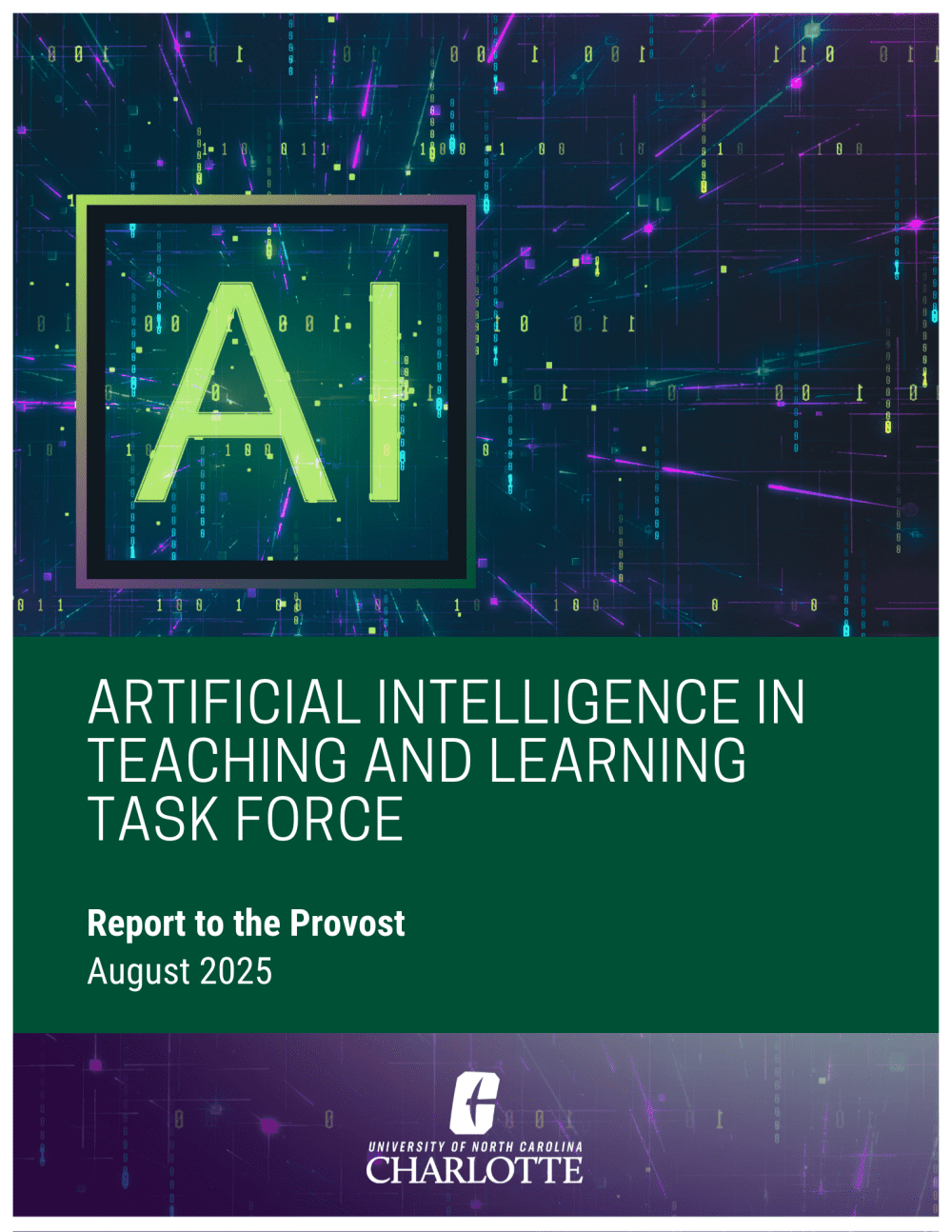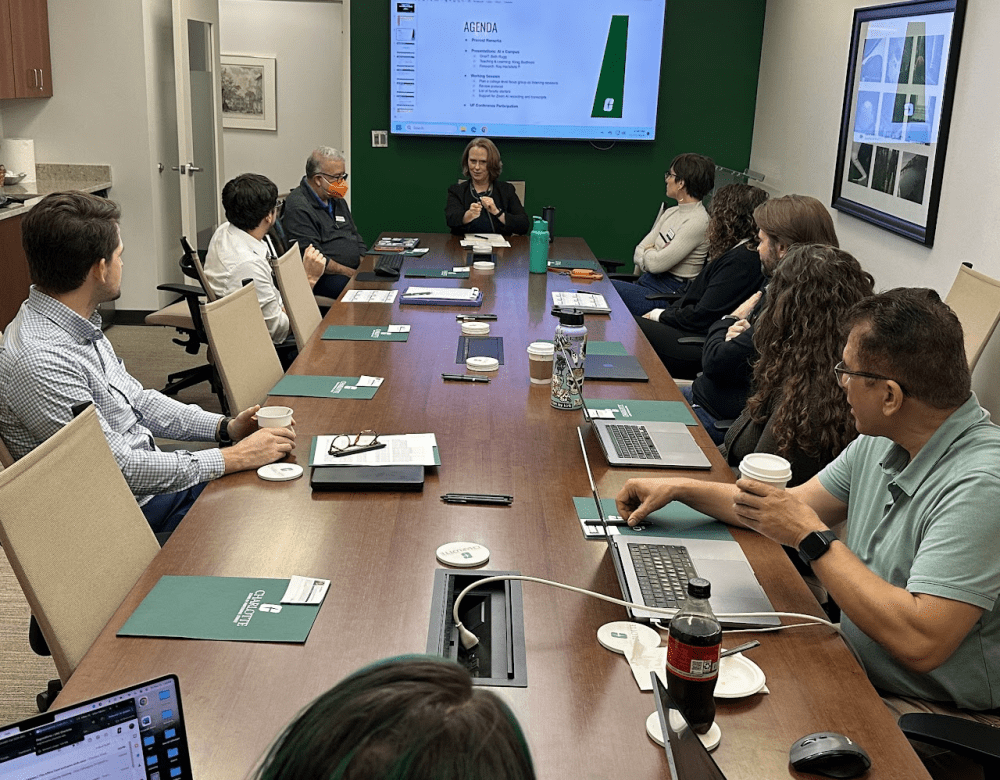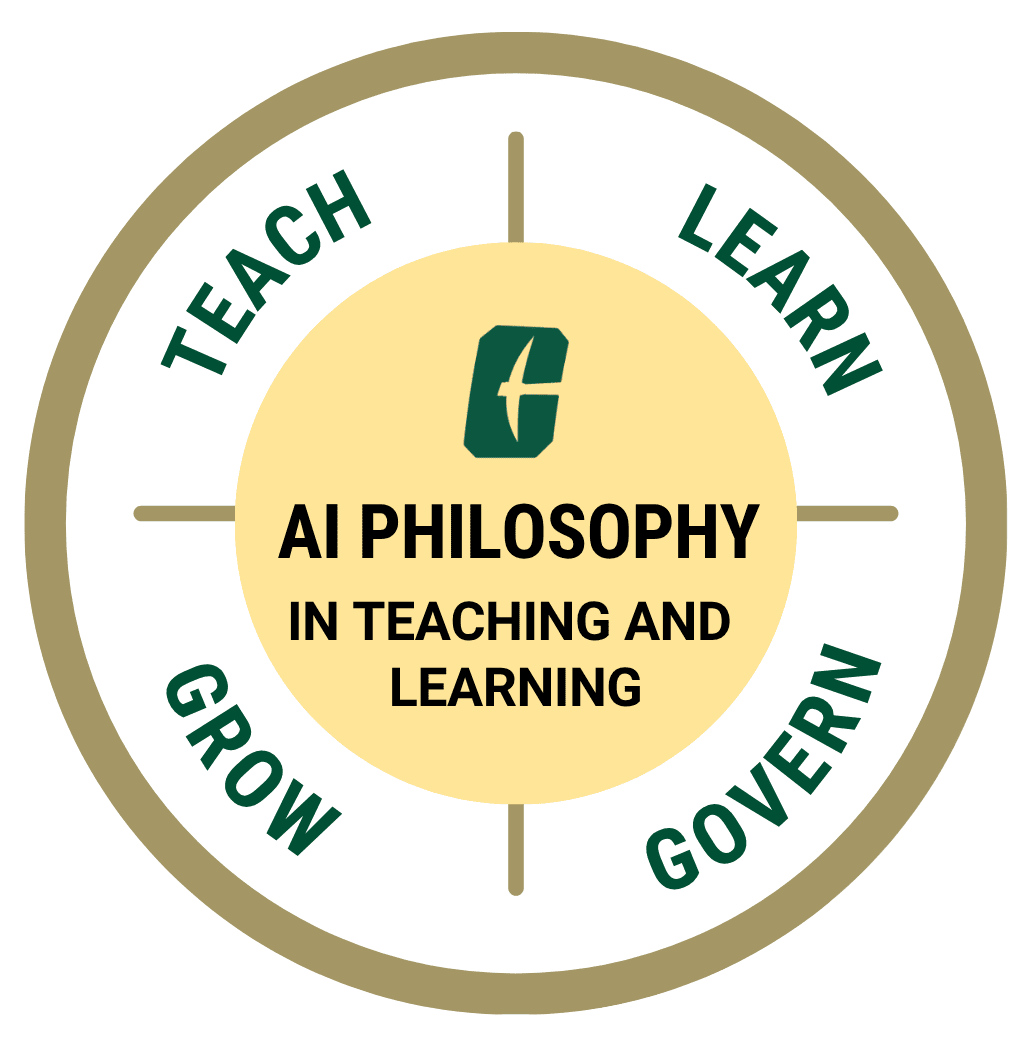AI TASKFORCE REPORT
UNC CHARLOTTE
AI in Teaching and Learning Task Force Recommendations
Executive Summary
AI Task Force Report Available
- Executive Summary
- AI Guiding Philosophies: TEACH, LEARN, GOVERN, GROW
- University-Wide Recommendations:
- Ethics, Policy, and Governance of AI Use
- AI Integration in Teaching, Learning, and Curriculum
- Technology Infrastructure, Training, and Support for AI
- College-Level Recommendations

Ai taskforce charge
1
AI Philosophy in Teaching and Learning
Develop and recommend a campus-wide philosophy regarding the use of AI
2
AI Policies in TEACHING AND LEARNING
Review current University policies related to the use of AI
3
BUILDING FACULTY CAPACITY FOR AI INTEGRATION
Examine needs related to building faculty capacity for AI integration in teaching and learning
campus engagement with the task force
Task Force Leadership
- Kiran Budhrani, Co-chair, AI Faculty Task Force, Director of Teaching and Learning Innovation, School of Professional Studies (SPS)/Center for Teaching and Learning (CTL)
- Manuel Pérez-Quiñones, Co-chair, AI Faculty Task Force, Professor in Software Information Systems, College of Computing and Informatics (CCI)
- Jordan Register, Instructional Designer & Technologist II, School of Professional Studies (SPS)/Center for Teaching and Learning (CTL)
Task Force Members
- Mona Azarbayjani, Professor and Director of Graduate Programs in Architecture, College of Arts + Architecture (COAA)
- Beth Caruso, Digital Pedagogy & Emerging Technologies Librarian, J. Murrey Atkins Library (LIB)
- Justin Cary, Senior Lecturer in Writing, Rhetoric and Digital Studies, College of Humanities & Earth and Social Science (CHESS)
- Mohsen Dorodchi, Teaching Professor in Computer Science, College of Computing and Informatics (CCI)
- Daniel Maxwell, University Supervisor/Lecturer in Middle, Secondary, and K-12 Education, Cato College of Education (COED)
- Sam Suptela, Associate Teaching Professor in Biological Science and Director of Assessment, Klein College of Science (KCOS)
- Lufei Young, Professor in Nursing, College of Health and Human Services (CHHS)
- Lina Zhou, Professor in Business Information Systems and Operations Management, Belk College of Business (BCOB)
- Qiang Zhu, Associate Professor in Mechanical Engineering and Engineering Science, William States Lee College Of Engineering (COE)

418 members
of the campus
provided input or feedback
As a university committed to growth and excellence, we’re not merely responding to AI, we’re called to shape it.
SUMMARY of TASK FORCE recommendations
I. Philosophies to Teach, Learn, Govern, and Grow with AI

OUR AI COMPASS
TEACH: Promoting Success in Teaching and Learning with AI
We commit to thoughtful, responsible, and ethical AI integration that supports teaching and learning in meaningful ways to enhance instruction, personalize learning, and support student achievement, keeping educational goals at the forefront.
LEARN: Balancing Human-AI Collaboration, Critical Thinking, and Creativity
We commit to leveraging AI as a learning partner, not a replacement, amplifying human and interdisciplinary collaboration, critical thinking, and creativity.
GOVERN: Advocating Ethical AI Governance for Openness, Transparency, and Accountability
We commit to maintaining openness, transparency, and accountability of AI use, ensuring responsible governance and ethical practices.
GROW: Intentional Growth in Resources for AI Adoption
We commit to systematically and intentionally growing resources that support thoughtful and effective AI adoption in support of teaching and learning.
II. Building an AI Ecosystem for Teaching and Learning

Recommendations on Ethics, Policy, and Governance of AI Use
1 – AI Policies and Guidelines for Responsible Use
1.1 Update syllabus policies to reflect accountability and transparency of AI use for both students and faculty
1.2 Develop a campus definition and framework for ethical and responsible use of AI
1.3 Develop university guidelines for student and faculty use of AI on accountability, transparency, trustworthiness
1.4 Define clearer institutional ethical & legal policies on data privacy, academic integrity, IP, and copyright
1.5 Develop tailored (i.e., not-one-size-fits-all) definitions, guidelines, and policies for contextual adoption of AI in teaching, learning, and curriculum across colleges
1.6 Improve uniformity in messaging on AI policy and use to students
1.7 Establish clear guidelines on faculty autonomy, flexibility, and agency on AI use
1.8 Review and update AI usage clauses in library databases
2 – AI Governance Structures
2.1 Establish a university-wide AI governance body with defined roles
2.2 Engage in regular review and feedback on AI guidelines and policies
2.3 Form interdisciplinary, college-level AI advisory committees for continuous oversight
Recommendations on AI Integration in Teaching, Learning, and Curriculum
3 – AI Curriculum Adoption and Reviews
3.1 Identify general education-specific (GenEd) learning outcomes in alignment to AI knowledge, skills, and competency areas (i.e., creativity, originality, critical thinking, numerical accuracy and analytical reasoning)
3.2 Engage in regular curriculum review and feedback on AI integrated programs and courses
3.3 Increase AI adoption with on-going curriculum review and inclusion of AI in topics, course outcomes, and assessments where applicable
3.4 Identify program- or course- specific learning outcomes in alignment to AI knowledge, skills, and competency areas
3.5 Establish faculty working groups (i.e., faculty fellows) for curriculum review and continuous development to meet AI needs
3.6 Review workload needs among all faculty and academic staff to facilitate increased and sustainable AI adoption
4 – Preparation for the AI Workforce
4.1 Strengthen university-industry collaboration to close the industry gap on AI workforce skills
4.2 Assess AI knowledge, skills, and competency areas essential to graduates and career goals
5 – Assessment of AI Adoption in Teaching and Learning
5.1 Increase funding for AI SOTL research grants, experimentation, and tool integration
5.2 Conduct assessment and evaluation of AI in teaching and learning (academic performance, cognitive abilities, ethical decision-making, and risk assessment)
Recommendations on Technology Infrastructure, Training, and Support for AI
6 – Training and Support for AI Awareness, Education, and Literacy
6.1 Develop educational awareness and literacy on use of AI tools, critical ethical and responsible use, and social and environmental impacts
6.2 Cultivate “AI literacy for all” by developing AI awareness, literacy, competency across all academic levels
6.3 Conduct regular AI needs analysis, evaluation, and feedback among students, faculty, and academic staff
6.4 Increase awareness and offer ongoing campus-wide AI training, workshops, and professional development
7 – Training and Support for AI in Teaching and Curriculum
7.1 Support faculty in designing AI-enhanced courses, lessons, and learning materials
7.2. Provide resources and support for program and/or curriculum review
7.3 Implement discipline-specific strategic programs for instructional design, curriculum review, and course development work
7.4 Provide resources and support for new modes of assessments, grading, and feedback
7.5 Develop a curated repository of AI use cases across disciplines
8 – Expansion of AI Tools and Services
8.1 Expand access to campus-supported AI software and cloud services (e.g., copilot with tools)
8.2 Provide guidance on enterprise tools and data security
8.3 Expand access to college-specific tools (eg., AI-powered feedback tools, simulations, and digital portfolios, virtual & augmented reality integration)
8.4 Provide resources and support for digital, AI-supported tutoring systems
individual
COLLEGE-LEVEL RECOMMENDATIONS
are INCLUDED IN THE REPORT
Belk College of Business (BCOB)
Cato College of Education (COED)
College of Arts + Architecture (COAA)
College of Computing and Informatics (CCI)
College of Health and Human Services (CHHS)
College of Humanities & Earth and Social Science (CHESS)
J. Murrey Atkins Library (LIB)
Klein College of Science (KCOS)
William States Lee College Of Engineering (COE)